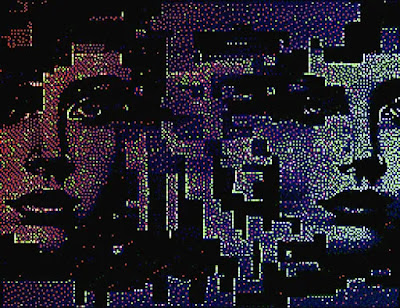A ‘Mirror World’ Where Leftist Disdain Feeds Right-Wing Paranoia
In her latest book, “Doppelganger,” Naomi Klein investigates an online underworld of conspiracies and misinformation, showing how its rise has inadvertently been fueled by political proReading the leftist writer and activist Naomi Klein’s new book, “Doppelganger,” feels like falling down a rabbit hole, albeit a dazzling and erudite one. It begins with Klein’s account of being confused on social media for Naomi Wolf, the feminist intellectual turned rabid anti-vaxxer, whom Klein calls “my big-haired doppelganger.” During the pandemic, Wolf began arguing, online and in a book, that vaccines and other public health measures were a plot by a “transnational group of bad actors” to sterilize people, turn children into drones and undermine the Constitution, among many other unhinged assertions.
It got to the point that when Wolf would say something
outlandish, people would tweet “Thoughts and prayers to Naomi Klein.” Needless
to say, it was disturbing for Klein, the serious author of books such as “No
Logo” and “The Shock Doctrine,” to be confused with “a person who can’t seem to
tell the difference between temporary public health measures and a coup
d’état.”
At first, Klein tries to ignore “Other Naomi,” to see the
comic side of the conflation; she files it into the category of “‘things that
happened on the internet that were not quite real’ (back when we were silly
enough to do that about all kinds of things).” And then she begins obsessively
to follow Wolf’s rise in what she calls the “Mirror World” of wild conspiracies
and right-wing paranoia. Klein hides from her family during the pandemic to
listen to Wolf on Steve Bannon’s podcast, spinning an analysis of her
“doppelganger” into a deft and intricate investigation of online culture and
political doubling.
By obsessively chasing “Other Naomi,” Klein attempts to face
and understand what most liberals simply try to avoid or shut out. She doesn’t
give in to the temptation to dismiss Wolf and other denizens of the Mirror
World as irrelevant crackpots and crazies; instead, she dives into a probing
investigation of their preoccupations and appeal.
On her highbrow romp through this disturbing underworld,
Klein’s writing is clear, dynamic, ruthlessly honest, imbued with a rare
integrity. She brings unusual rigor to her examinations of herself, including
her flaws. She is that nearly extinct breed of activist: one who never stops
questioning orthodoxies and interrogating her own beliefs. “Doppelganger”
showcases her superb ability to cut through clichés and received ideas, as well
as intellectual conventions.
By mapping the evolution of her doppelganger, along with
other pockets of online paranoia that flourished during the pandemic, Klein
traces how well-intentioned liberals begin to mirror the anti-vaxxers: “We
defined ourselves against each other and yet were somehow becoming ever more
alike, willing to declare each other non-people.” She carefully untangles on
the right a “mimicking of beliefs and concerns that feeds off progressive
failures and silences.”
In Klein’s view, “When entire categories of people are reduced to their race and gender and labeled ‘privileged,’ there is little room to confront the myriad ways that working-class white men and women are abused under our predatory capitalist order, with left-wing movements losing many opportunities for alliances.” She points out that such reductive labeling is “highly unstrategic,” since the Mirror World is waiting for people alienated or exiled by the left, offering them forums and sympathy.
“Doppelganger”’s rabbit-hole form allows it to flow from
wellness influencers turned anti-vaxxers during the pandemic to parents of
autistic children, to Nazis, to Israel, to Klein’s husband’s potential
political constituents. (In 2021, Klein’s husband, Avi Lewis ran
unsuccessfully, for a seat in the Canadian Parliament.) Her references jump
from Iris Murdoch to Charlie Chaplin, Philip Roth, Marx and Freud, and one of
the great pleasures of the book is watching her mind synthesize this
confounding and volatile political moment with such originality and verve.
If Klein’s jargon can sound like it’s lifted from a slick
new Netflix series — with her “Shadow Lands,” “Mirror World” and
“doppelgangers” — there is a drama and stylishness to her inquiry that is hard
to resist. By deploying the idiom of psychological thrillers, she infuses
energy into her often dense or theoretical material.
She emerges from her long wrangle with her own doppelganger
with a new sense of distance from the person she is online. Because Wolf has
injected “a hefty dose of ridiculousness into the seriousness with which I once
took my public persona,” Klein writes, she feels freed from her public self.
She refers to the process as an “unconventional Buddhist exercise in
annihilating the ego,” and quotes John Berger’s observation to her that “calm
is a form of resistance.”
If some of Klein’s larger-scale solutions toward the end of
the book seem pat or elusive (teach people the true meaning of words like
“patriarchy” and “imperialism”; recognize our interconnectedness), I
nonetheless admired her impulse to write her way out of despair. There is
something hopeful in this project, in its sheer intellectual ambition and
range, its effort to pick apart and decipher the absurdities and ironies of our
political derangement, which almost no other writer could pull off. If I had to
name a single book that makes sense of these last few dark years, it would be
this one.
https://www.nytimes.com/2023/09/07/books/review/doppelganger-naomi-klein.html

No hay comentarios:
Publicar un comentario